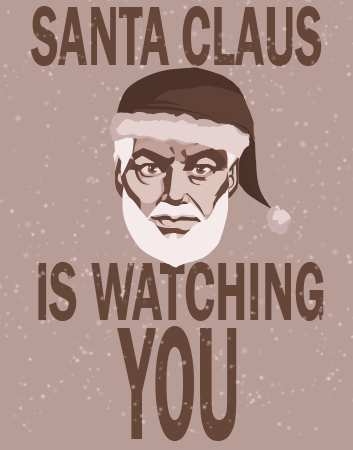Santa
Claus is Coming to Town is a very popular Christmas song which,
although jolly in nature, reinforces the thought that "Santa is always
watching and judging behaviour" in the minds of children. After taking a
course in Contemporary Social Theory, I immediately drew parallels between the
song lyrics of Santa Claus is Coming to
Town and Jeremy Bentham's panopticon when listening to my favourite
Christmas hits this holiday season.

You better watch out
You better not cry
Better not pout
I'm telling you why
Santa Claus is coming to town
You better not cry
Better not pout
I'm telling you why
Santa Claus is coming to town
He's making a list
And checking it twice;
Gonna find out Who's naughty and nice
And checking it twice;
Gonna find out Who's naughty and nice
Santa Claus is in charge of all the
presents, and in the mind of a child, all the excitement that surrounds Christmas
morning. He has the ability to put an ends to all the gifts that children will
receive as a result of crying, pouting and naughty behaviour. Children are
reminded through these lyrics that if they are not properly behaved, their
Christmas may be spoiled.
He sees you when you're sleeping
He knows when you're awake
He knows if you've been bad or good
So be good for goodness sake!
He knows when you're awake
He knows if you've been bad or good
So be good for goodness sake!
During the holiday season, children are reminded through
these lyrics that Santa can always see them. On Christmas night, if they are
not sleeping, he will not come bring them gifts. They are reminded that
although they do not know if he is watching at all times, that he has the
ability to constantly watch them and could be. To be safe, it is best for
children to be good at all times.
These lyrics serve as a reminder and warning during
Christmas time that Santa rewards good behaviours and punishes poor behaviour. Children
are reminded through spottings of Santa Claus at the mall and through other
media that he is real. They write him letters and when they receive a response,
this realism is confirmed. They are told by their parents that he is magical and
therefore it is believable that he can watch you at all times. These lyrics are
played over and over again at Christmas time and are referenced by parents when
telling their children to behave. They are a reminder, constantly in the heads
of children about the power that Santa holds and his ability to see them at all
times. With that in mind, let's consider
Bentham's ideology of power and the panopticon.

Michel Foucault writes in his 1975 work Discipline & Punish: The Birth of thePrison how the panopticon is effective in its design by establishing and
sustaining a power relation where the prisoner feels as though they are
constantly monitored even if the surveillance is discontinuous in its action. Bentham
believed that power, in order to be most effective, should be visible and
unverifiable.
Visible:
the inmate will constantly have before his eyes the tall outline of the central
tower from which he is spied upon.
Unverifiable:
the inmate must never know whether he is being looked at at any one moment; but
he must be sure that he may always be so.
Can you see the parallels? I sure can...
No comments:
Post a Comment